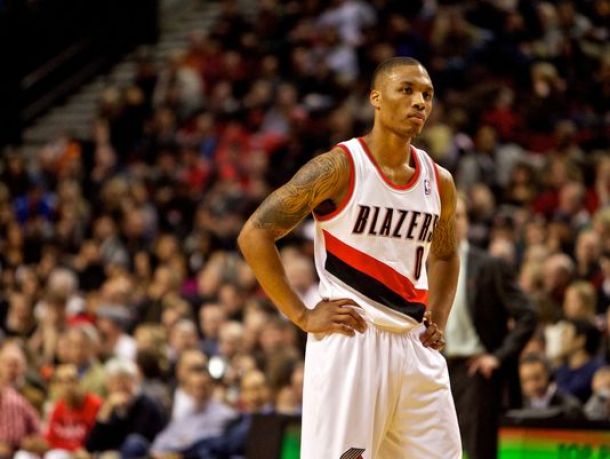This upcoming season will be when the NBA truly gets to see the potential of Weber State graduate Damian Lillard. He’s been playing alongside LaMarcus Aldridge, Nicolas Batum, and Wesley Matthews his whole career, but now he’s left alone as the face of Portland’s franchise. His leadership skills and hard working attitude will be put to the test as the rebuilding Blazers hope to retain a shred of dignity during the season after losing their core players.
Portland’s offseason roster overhaul has improved Lillard’s already high fantasy value, giving him more opportunities to step up and become a leader. His point and assist totals from last season should undoubtedly rise like they have in previous seasons, but his percentages may lower due to the pressure of leading such a young team through close matchups.
Last year, Lillard averaged a career-high 21 points along with 6.2 assists, and 1.2 steals a night. He shot a solid 43 percent from the field, but a woeful 34 percent from beyond the arc. Other elite point guards ranked much higher in three-point percentage, like Stephen Curry, Kyrie Irving and Chris Paul, who all came in at over 40 percent from deep. Unfortunately, this number may see further decrease since the Blazers are more offensively reliant on Lillard than before.
While his assist numbers are anticipated to rise this season, losing scorers like Batum, Matthews and Aldridge hurts Lillard’s ability to assist. He’ll need to set up teammates with easier opportunities, giving fewer margins for error amongst the new arrivals. It will take time for them and Lillard to adapt to Coach Terry Stotts’ fast paced offense debut, but the transition play could provide for easy assists to big guys like Ed Davis, Mason Plumlee and Noah Vonleh.
A problem with Lillard’s game for both fantasy owners and the Blazers is his defense. Portland as a team ranked in the top half of the league in most defensive categories thanks to Matthews, Batum and Lopez, but Lillard let opposing point guards run freely, making their jobs tougher.
For a team that might struggle on offense, the Blazers need to uphold a strong defensive wall, and Lillard is the keystone of the defense. Shutting down the opposing point guard makes running the offense virtually impossible, and fast hands can help lead to numerous fast breaks, perfect for Stotts’ planned offense. Lillard only averaged a steal a game last season, but several nights this season he could record two or more, fueling the up-tempo offense and putting points on the board for Portland.
Lillard’s consistency was a little underwhelming last season, mainly due to Portland’s star-studded roster before the injuries hit. If he wasn’t having an ideal shooting night, the other starters would take over and score a bulk of the points, enabling Lillard to assume a smaller role on offense. This year, however, he won’t have that safety and must lead the Blazers offensively night in and night out. Sure, he’ll having a poor game here and there, but so does everyone.
Like with Carmelo Anthony, Lillard has the ability to completely tank a fantasy owners shooting percentage one week. They’re both heavily relied on for offense on their respective teams, and even when shots aren’t falling, they are required to keep throwing them up in hopes of sparking a run or simply avoiding an embarrassing 20-point loss.
Last is durability, Lillard’s strong suit. In his three-year career, he’s not only played, but started in every single possible game. He’s managed to fend off the infamous Portland injury bug that’s taken so many careers before (knock on wood). Drafting Lillard means production every single night, and due to the major roster overhaul, production means more than 20 points and six assists a night.
Durability: A+
Overall Stats: A-
Consistency: A-
Mock Draft Ranking: #12

